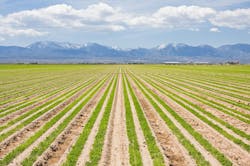California Water Districts, Farmers Look to Recharge Ponds for Water Storage
A coalition of local farmers, along with the the city of Huron, California, are trying to turn former hemp and tomato fields into receptacles that can hold water as it percolates into the ground during wet years.
In recent times, the land along the Arroyo Pasajero Creek, which is about halfway between Sacramento and Los Angeles, has been alternating between years that are too dry to farm and too flooded.
According to Reuters, this project, similar to others in the area, aims to "capture floodwaters that would otherwise rush out to the sea, or damage towns, cities and crops."
Due to historic drought and water scarcity this year, Huron was allocated only a quarter of the water is was contracted to receive from the U.S. Bureau of Reclamation. In turn, the city had to buy water from the open market, thus raising residents' bills.
This proposed project, which is known as a recharge system, will ideally turn unused fields into " large ponds to hold water so that it can percolate into the porous rock and earth below, creating or restoring an aquifer rather than rushing to the sea.The city is building a new well to be fed from the aquifer," Engineering Consultant Alfonso Manrique told Reuters.
Additionally, capturing this runoff will help protect the city from "catastrophic floods."
This influx of projects follows a recent California law regulating groundwater use.
This project is one of approximately 340 recharge systems that have been proposed by water agencies throughout California. If all are approved, they would provide enough space to store 2.2 million acre-feet by 2030, which is enough for 4.4 million households for a year.
Aarok Fukuda, general manager of the Tulare Irrigation District, told Reuters that Okieville, about 40 miles east of Huron, is building a new recharge pond as well. This project followed the state's biggest drought from 2012 through 2016 when some Okieville residents ran out of potable water. According to Reuters, the new pond will help guide water underground to store it for residents and agriculture.
Aside from projects being done by rural water districts, the Metropolitan Water District, which serves Southern and parts of central California, is building a 1,500-acre recharge pond near Palmdale in partnership with local water authorities, Reuters said.
